|
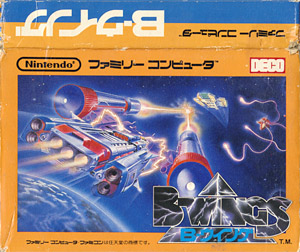
|

|
|
B-ウイング
©1986 Data East Corp.
Release: 1986-06-03 (¥4900)
Cartdridge DFC-BW
Shooter/vertical
|
B-Wings is a vertical shooter by Data East and conversion of
an arcade game originally released in 1984. The Earth Federation has
dispatched its FX-1 prototype star fighter to counter an impending enemy
attack. The elite pilot and his ship must both go on a suicide mission deep
inside enemy territory. The general gist of the game is to fly though thirty
levels, destroy enemy ships, ground installations and massive Gobunasu
armored fortresses. Although the FX-1 is relatively weakly armed in its
simplest form, it has the ability to equip weapon modules called "Wings".
They come in ten different types - Anti-Wing, Cannon Wing,
Dyna-Wing, Fire-Wing, Jump-Wing, Hammer-Wing,
Multiple-Wing, Side-Wing, Van-Wing and Wide-Wing.
Each Wing weapon-module has its own special characteristics - some have a
longer range than others, some shoot in a specific direction, some use explosive
shells whereas others fire a frontal jet of flames or shield the fighter
against enemy attacks. Although the player can select a power Wing
at the beginning of the game, a collision with another enemy ship results in
the destruction of such module (the second action button also ejects the
equipped Wing). Thankfully in these emergency situations, the player
has the option to collect other Wings left behind by special flying pods.
The second action button also allows the player to dive down for a short amount of time
in order to avoid enemy attacks (ejecting the equipped Wing in the process).
B-Wings features a two-player alternating option.
|
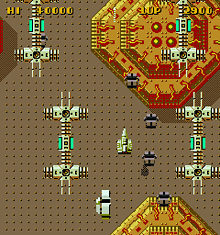 The original B-Wings arcade game (also known as Battle Wings)
was released by Data East in 1984 (picture on the left). However, the Famicom conversion
tested here is drastically different and is more a remixed version than an
straight port. The original arcade game had enemies on the ground layer, and
although players can still dive down in the Famicom port, this maneuver
is now only designed to escape enemy attacks. Then all the enemy installations actually
floated over the background, unlike the
Famicom port where they are part of the scenery and are laid out on a
grid-like pattern. The list of available Wings is also different - whereas
the arcade features eight, the Famicom version has ten on offer (plus
three hidden ones, see the secret section), and removed
the Ground-Wing designed to fire down on the ground (as aforementioned,
ground enemies do not exist in this port). Also, the arcade game didn't have
any music which is not the case for the Famicom port. Finally, the
original game consists of forty five levels, whereas the Famicom
port features thirty.
The original B-Wings arcade game (also known as Battle Wings)
was released by Data East in 1984 (picture on the left). However, the Famicom conversion
tested here is drastically different and is more a remixed version than an
straight port. The original arcade game had enemies on the ground layer, and
although players can still dive down in the Famicom port, this maneuver
is now only designed to escape enemy attacks. Then all the enemy installations actually
floated over the background, unlike the
Famicom port where they are part of the scenery and are laid out on a
grid-like pattern. The list of available Wings is also different - whereas
the arcade features eight, the Famicom version has ten on offer (plus
three hidden ones, see the secret section), and removed
the Ground-Wing designed to fire down on the ground (as aforementioned,
ground enemies do not exist in this port). Also, the arcade game didn't have
any music which is not the case for the Famicom port. Finally, the
original game consists of forty five levels, whereas the Famicom
port features thirty.
|
Game Staff (Copied from the game's end credits) :
|
STAFF
H. Yoshida
Y. Sugahara
|
|
N. Nakazawa
A. Hara
T. Yamaguchi
Y. Kitahara
|
|
|
G
O
O
D
I
E
S
|
|
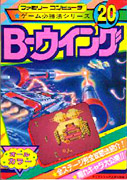
Japanese Guidebook
|
|
|
O
M
A
K
E
|
|
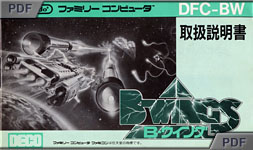
|
|
|
Click on picture to enlarge |
S
E
C
R
E
T
S
|
|
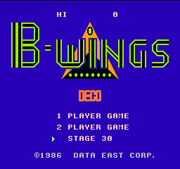 Stage select:
Stage select:
On the title screen, hold Up and press A, hold Right and press A,
hold Down and press A, hold Left and press A,
hold Left and press B. You will hear an explosion sound confirming
you that the code is enabled. Press select twice to highlight the Continue option and
press Up and Down to select a level (picture on the right). Press start to play.
Weapon select:
Once the Stage select code has been activated, pause at anytime during the
game and press Select to cycle through the available Wings (this
comes in limited quantities though).
Hidden Wings:
There are three hidden Wings in the game that seem to appear after
destroying certain obstacles (it is not really clear which ones). The first one
shoots large ring-shaped beams, the second one shoots black spheres (identical to
the Hammer-Wing) in eight directions and the third Wing
shoots pink helix-shaped beams in four directions.
Secret Items:
 Most of these secret items are hidden inside certain obstacles, and turn
into an umbrella when shot at (which doesn't seem to have much effect).
The most common item is shaped like a letter -
the player must shoot it in order to change that letter and eventually equip another Wing.
Another one is a flashing Vol item that gives the player the ability to switch weapons. Once activated,
the player can pause the game and press select to equip another Wing.
However, this only works once, and another Vol item needs to be picked up to
switch again (they can be stocked up though).
Other items are a lot more obscure - a set of items with card
faces on them give various upgrades such as an armor or extra lives, and one
shaped like a horse head (or a chess knight piece) doesn't seem to do anything (maybe just extra points ?).
Finally, another one shaped like a shooting star gives the player the ability
to warp ahead and skip four stages!
Most of these secret items are hidden inside certain obstacles, and turn
into an umbrella when shot at (which doesn't seem to have much effect).
The most common item is shaped like a letter -
the player must shoot it in order to change that letter and eventually equip another Wing.
Another one is a flashing Vol item that gives the player the ability to switch weapons. Once activated,
the player can pause the game and press select to equip another Wing.
However, this only works once, and another Vol item needs to be picked up to
switch again (they can be stocked up though).
Other items are a lot more obscure - a set of items with card
faces on them give various upgrades such as an armor or extra lives, and one
shaped like a horse head (or a chess knight piece) doesn't seem to do anything (maybe just extra points ?).
Finally, another one shaped like a shooting star gives the player the ability
to warp ahead and skip four stages!
|
|
|
|
|
LK

|
|
Add your Pov here !
|
P
O
V
s
|
|
I have mixed feelings about B-Wings. The game starts out pretty
slow and you expect it to gain momentum along the way... but it never
really does. I mean, the game isn't necessarily all bad news - the action is
fast and each stage
features its own set of unique enemies and hostile bosses. The latter
actually follow the same formula throughout the game, and consist of
multiple connected modules (well, except maybe for a couple of odd balls,
such as a giant spider and a green frog). There is also some strategy
to it - for instance, some bosses or levels are easier to beat with a
particular Wing, and it can be fun to find out which ones
(the game gives you some clues though). But levels are a bit bland and,
the fact is, most of them look alike. Also, all the Wing modules
look pretty much the same, their firing range is very limited and it
is quite hard to distinguish them in the fire of action. I am also not a
big fan of the soundtrack which feels a bit too "joyful" for a
shooter. In the end B-Wings is a mixed bag, tons or weapons but
half of them are useless, the bosses are impressive but rather repetitive
in design and the ship just moves too slowly. Although looking
for all the secrets hidden in the game certainly add some replay value,
B-Wings is in the end an average shooter.
|
|
|
|